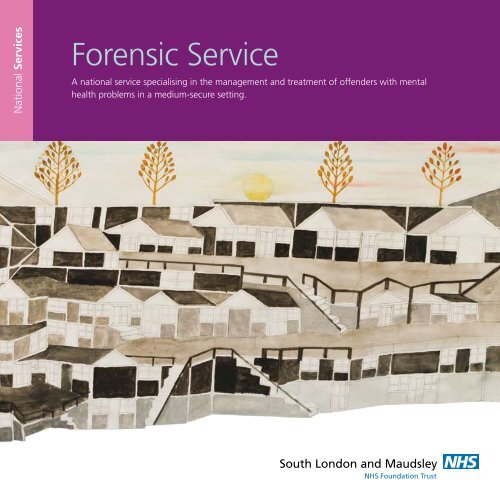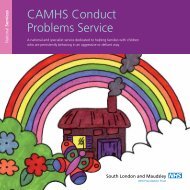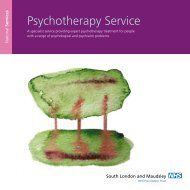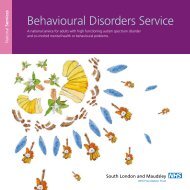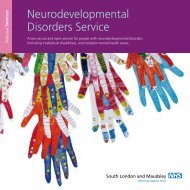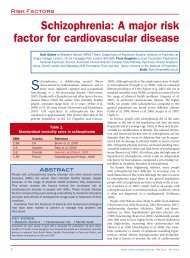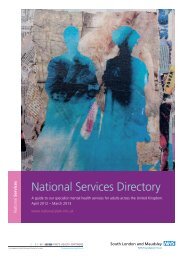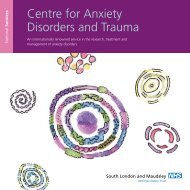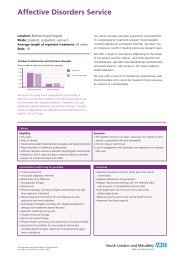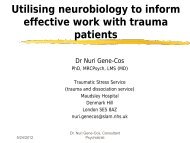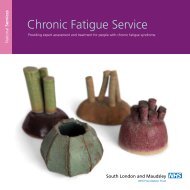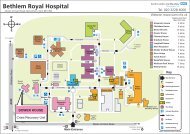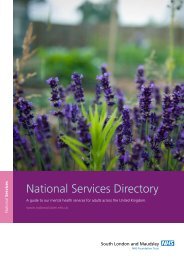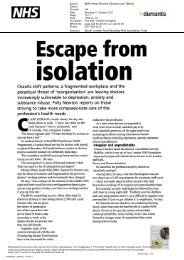Forensic Service booklet - SLaM National Services
Forensic Service booklet - SLaM National Services
Forensic Service booklet - SLaM National Services
You also want an ePaper? Increase the reach of your titles
YUMPU automatically turns print PDFs into web optimized ePapers that Google loves.
<strong>National</strong> <strong>Service</strong>s<br />
<strong>Forensic</strong> <strong>Service</strong><br />
A national service specialising in the management and treatment of offenders with mental<br />
health problems in a medium-secure setting.
South London and Maudsley NHS Foundation Trust<br />
» I’m really looking forward to having my freedom so I can<br />
get on with life. What I’ve done in the past is in the past<br />
now, and I’m looking forward to the future. I’d recommend<br />
the Bethlem to anyone. I’m leaving with lots of tools that<br />
will help me. I’ve got a whole case load! « Amanda<br />
Cover artwork by Barrington, a patient in the <strong>Forensic</strong> <strong>Service</strong>, 2011<br />
2
<strong>National</strong> <strong>Service</strong>s: <strong>Forensic</strong> <strong>Service</strong><br />
Contents<br />
<strong>Service</strong> overview 4<br />
Our philosophy 5<br />
Who is our service for 6<br />
Interventions 8<br />
Care pathway 14<br />
Outcomes 16<br />
Research 18<br />
Our facilities 20<br />
Our team 24<br />
Case studies 30<br />
Referring to our service 34<br />
3
South London and Maudsley NHS Foundation Trust<br />
<strong>Service</strong> overview<br />
Our service works to ensure that offenders with mental health problems are assessed and<br />
treated effectively, in the least restrictive environment. We aim to manage the risk, reduce<br />
further offending and support recovery throughout the person’s stay.<br />
Our service complies with the national standards set out in<br />
the Department of Health Best Practice Guidance:<br />
Specification for Adult Medium Secure <strong>Service</strong>s. Treatment is<br />
developed collaboratively between our staff and our patients.<br />
King’s Health Partners<br />
Our service is part of the Behavioural and Developmental<br />
Psychiatry Clinical Academic Group. <strong>SLaM</strong> has joined with<br />
King’s College London, Guy’s and St Thomas’ NHS<br />
Foundation Trust, and King’s College NHS Foundation Trust<br />
to establish King’s Health Partners, an Academic Health<br />
Sciences Centre. King’s Health Partners involves bringing<br />
clinical care, research and education much more closely<br />
together. Our aim is to reduce the time it takes for research<br />
discoveries and medical breakthroughs to become routine<br />
clinical practice. This will lead to better care and treatment<br />
for patients.<br />
Visit www.kingshealthpartners.org for more information.<br />
» Psychology helps me discover more<br />
about myself. « Chris<br />
4
<strong>National</strong> <strong>Service</strong>s: <strong>Forensic</strong> <strong>Service</strong><br />
Our philosophy<br />
Our aim is to promote and improve the mental health, well-being and safety of detained<br />
patients, and involves a dynamic negation of the conflicts between detention and care.<br />
Our service is driven by a philosophy of helping people to<br />
develop optimal feelings of hope for their future,<br />
opportunities to live personally satisfying and meaningful<br />
lives and techniques of self-control, so that they might feel<br />
a sense of empowerment over their difficulties.<br />
Our philosophy includes:<br />
››<br />
››<br />
››<br />
Modelling our service on the recovery approach<br />
Involving the patient in the development of, research into<br />
and evaluation of our treatments<br />
Focusing on the well-being of each patient in a holistic way, as<br />
well as symptom management and offence-related treatment<br />
» Being on the ward helps you get back<br />
to normal life by learning techniques to<br />
tackle everyday stress. « Andrew<br />
5
South London and Maudsley NHS Foundation Trust<br />
Who is our service for<br />
Our service is for people who have mental health problems and who have become involved<br />
with the criminal justice system. We assess and manage people who cannot safely be treated in<br />
conditions other than a medium security environment.<br />
Eligibility<br />
›› 18+ years<br />
›› Male or female<br />
›› Psychosis or personality disorder with a history of risk of<br />
violence to others<br />
›› Psychosis or personality disorder with risk of imminent but<br />
not grave harm to others<br />
›› Psychosis or personality disorder with a history of<br />
offending behaviour<br />
Exclusion<br />
›› No mental health problem<br />
›› Primary diagnosis of alcohol or other substance misuse<br />
›› Brain damage or other organic disorders,<br />
including dementia<br />
›› Diagnosis of a learning disability without a co-existing<br />
mental health problem<br />
›› Autistic spectrum disorders without a co-morbid mental<br />
health problem<br />
» Getting well, staying well and being able<br />
to tackle life without reverting back to old<br />
ways that did not work has been good. «<br />
Joe<br />
6
<strong>National</strong> <strong>Service</strong>s: <strong>Forensic</strong> <strong>Service</strong><br />
7
South London and Maudsley NHS Foundation Trust<br />
Interventions<br />
Our interventions have been designed to follow our focused approach to care delivery, modelled<br />
on the international recovery movement. This methodology leads to greater inclusion, more choice<br />
and a better understanding of what is helpful to our patients as they move through the service.<br />
Each person’s therapy and recovery journey is tailored to their<br />
needs. These interventions may be provided from admission<br />
through to integration into the community:<br />
›› Sessions which introduce people to group work and<br />
engage them in meaningful activities<br />
›› Skills-based, psycho-educational groups<br />
›› Offending behaviour interventions<br />
›› Vocational skills assessment and programme<br />
›› Recreational activities<br />
›› Spiritual, religious and cultural activities<br />
›› Creative workshops<br />
›› Individual psychological therapy<br />
›› Family therapy<br />
Group work and engagement activities<br />
Engagement is vital when beginning the process of recovery.<br />
We engage people in activities that give them a sense of<br />
meaning and purpose, and also in a process of reflecting on<br />
themselves and their capacity to make choices in their lives.<br />
Skills-based psycho-educational groups<br />
Following a process of successful engagement, we offer a<br />
range of treatments that have been developed with guidance<br />
from both evidence-based literature and patient feedback. Our<br />
skills-based treatment groups seek to inform patients about<br />
their difficulties, and also give them the skills and strategies to<br />
manage these, while helping them to develop a greater sense<br />
of control over their lives.<br />
Offending behaviour interventions<br />
Our interventions address dangerous behaviour across a<br />
spectrum of manifestations, including offending behaviour<br />
that has been prosecuted through the courts as well as<br />
difficult behaviour whilst in care. Our programme of care seeks<br />
to develop a formulation of the patient’s behaviour so that<br />
vulnerabilities, high risk situations, thoughts, moods and<br />
strategies to avoid future dangerous behaviour are explored.<br />
Relapse prevention planning is undertaken to ensure that the<br />
progress made in therapy is maintained in the future and the<br />
person continues to have the greatest amount of control<br />
possible over their lives.<br />
Vocational skills programme<br />
Our vocational skills training programme works with patients<br />
to facilitate the development of a range of skills and<br />
qualifications, which are individually tailored to promote<br />
confidence and self-worth in preparation to integrate into the<br />
community. Meaningful occupation is critical in improved<br />
social and clinical functioning.<br />
Following a vocational skills assessment, individual goals are<br />
set with the patient and a contract and role description is<br />
established. This outlines the expectations for each vocational<br />
occupation for the patient.<br />
The programme provides a variety of activities and occupations<br />
that promote an active, social and meaningful life for the person.<br />
8
<strong>National</strong> <strong>Service</strong>s: <strong>Forensic</strong> <strong>Service</strong><br />
» Groups give you the knowledge to be able to deal with situations that come up and<br />
make you feel more confident. « Jesse<br />
Activities include running the in-house shop and library,<br />
information technology, education and gardening.<br />
Therapeutic leave<br />
We use the Buddi tracker system which has been designed<br />
specifically for use in forensic mental health settings. It is the<br />
world’s smallest assisted-GPS tracker, which locates people<br />
instantly and accurately. People are individually risk assessed<br />
for leave and each person consents to using the Buddi system<br />
as part of their therapeutic leave programme.<br />
Occupational therapy<br />
Each ward has an occupational therapist who works with<br />
patients to develop a therapeutic programme through various<br />
interventions and group work.<br />
An assessment identifies areas of strength and areas that need<br />
to be developed, to maximise independence and develop skills<br />
that increase feelings of competence, self-esteem and<br />
confidence in preparation for discharge.<br />
We provide ward-based groups, as well as various activities<br />
through the therapy and self-development centre. These<br />
include creative workshops, music, sport and fitness,<br />
dramatherapy, art, digital art, and social activities. Our service<br />
also provides support for people to engage in spiritual,<br />
religious and cultural activities of their choosing.<br />
Psychological therapy<br />
In addition to the group programme, individual therapy is also<br />
available wherever it is needed. All patients receive a tailored<br />
assessment and formulation of their needs. This will inform<br />
the care they receive, both in individual and group settings.<br />
Therapies include a range of models appropriate to the needs<br />
identified, including cognitive behavioural therapy,<br />
psychodynamic therapy and mentalization-based therapy.<br />
Family therapy<br />
Many of our patients benefit from treatment that involves<br />
their family. We facilitate family interventions that allow<br />
patient difficulties to be shared and managed by both patients<br />
and carers. We aim to increase the understanding of the<br />
patient’s illness within a family setting, and to encourage<br />
patients and carers to feel empowered.<br />
Wellness recovery action plan<br />
To help patients control their well-being and recovery, each<br />
person is given a portfolio that allows them to document their<br />
recovery as they wish. Typically, this will include certificates from<br />
treatments and interventions they have completed, relapse<br />
prevention plans, risk assessment reports and other evidence of<br />
progress. In addition to these portfolios, people may also<br />
complete a secure unit version of a Wellness Recovery Action<br />
Plan: Recovery in Secure Environments. This offers people<br />
realistic and practical ways of remaining safe and well, building<br />
upon other therapeutic work they have undertaken.<br />
9
South London and Maudsley NHS Foundation Trust<br />
Weekly programme<br />
Time MONDAY TUESDAY WEDNESDAY THURSDAY FRIDAY SATURDAY SUNDAY<br />
08.00 –<br />
10.00<br />
Personal care<br />
Breakfast<br />
Medication<br />
9:30 – Meeting<br />
Personal care<br />
Breakfast<br />
Medication<br />
9:30 – Meeting<br />
Personal care<br />
Breakfast<br />
Medication<br />
9:30 – Meeting<br />
Community<br />
meeting<br />
Personal care<br />
Breakfast<br />
Medication<br />
9:30 – Meeting<br />
Personal Care<br />
Breakfast<br />
Medication<br />
9:30 – Meeting<br />
Breakfast<br />
Medication<br />
Breakfast<br />
Medication<br />
10.00 –<br />
12.00<br />
Crossword<br />
Managing<br />
mental health<br />
Substance<br />
misuse<br />
Digital art<br />
Sport<br />
Discussion<br />
group<br />
Motivation to<br />
change<br />
Gardening<br />
Music studio<br />
Art<br />
Sport<br />
Current affairs<br />
Music studio<br />
Shop and library<br />
Reasoning and<br />
rehabilitation<br />
Monthly service<br />
Sport<br />
Table tennis<br />
Leavers group<br />
Education, IT<br />
Sport<br />
Photography<br />
Relaxation<br />
Sport<br />
Bread making<br />
Art<br />
Education, IT<br />
Prayer meeting<br />
Personal care<br />
Visiting time<br />
Social Breakfast<br />
– patients<br />
cooking<br />
Visiting time<br />
12.00 –<br />
14.00<br />
Lunch, own time<br />
Picture framing<br />
Lunch, own time<br />
Lunch, own time<br />
Digital art<br />
Lunch, own time<br />
Lunch, own time<br />
14.00 –<br />
16.00<br />
Education, IT<br />
Sport<br />
Shop and library<br />
Art<br />
Relaxation<br />
IT<br />
Sport<br />
Gardening<br />
Shop and library<br />
Managing<br />
mental health<br />
Substance<br />
misuse<br />
Gardening<br />
Music studio<br />
Healthy lifestyle<br />
Sport<br />
Shop and library<br />
Relationship<br />
group<br />
Creative music<br />
Sport<br />
Shop and library<br />
Art<br />
Education, IT<br />
Social themed<br />
meal – one or<br />
two patients<br />
cooking cultural<br />
meal for the<br />
unit<br />
Visiting time<br />
Pool<br />
competition<br />
Visiting time<br />
16.00 –<br />
18.00<br />
17:00 – Dinner<br />
DVD evening<br />
Visiting time<br />
17:00 – Dinner<br />
Board games<br />
Visiting time<br />
17:00 – Dinner<br />
Computer<br />
games<br />
Visiting time<br />
17:00 – Dinner<br />
DVD evening<br />
Visiting time<br />
17:00 – Dinner<br />
Takeaway<br />
evening<br />
Visiting time<br />
Table tennis<br />
Visiting time<br />
Visiting time<br />
10
<strong>National</strong> <strong>Service</strong>s: <strong>Forensic</strong> <strong>Service</strong><br />
11
South London and Maudsley NHS Foundation Trust<br />
Our care model<br />
RISK MANAGEMENT<br />
›› Ensuring public safety using the<br />
Buddi GPS tracker technology for<br />
therapeutic leave<br />
›› Patient-led risk management plans<br />
›› Multi-professional and multi-agency<br />
(MAPPA, MoJ, Probation, Police) risk<br />
management plans<br />
›› Comprehensive tiered risk<br />
assessment and management plan<br />
ASSESSMENTS<br />
›› Specialist risk assessments<br />
›› Assessment of psychopathology<br />
›› Treatment needs analysis<br />
›› Neuro-psychological assessments<br />
›› Neuro-psychiatrist assessment<br />
›› Neuro-imaging studies<br />
›› Physical health assessment<br />
›› Motivational and functional assessments<br />
›› Educational assessments and diagnosis of<br />
literacy and dyslexia<br />
›› Vocational skills assessment<br />
FAMILIES AND CARERS<br />
›› Family assessments<br />
›› Education about offending<br />
behaviour and triggers for relapse<br />
›› Family therapy<br />
›› Engagement in regular carer forum<br />
›› Carer involvement in patient care,<br />
service development and research<br />
PATIENT<br />
›› Understanding risk management<br />
interventions<br />
›› Active engagement in reducing<br />
violence and re-offending<br />
›› Understanding impact of risk<br />
behaviours and support to re-engage<br />
with community<br />
›› Support to engage in social<br />
skills training<br />
›› Understanding diagnosis and<br />
managing symptoms<br />
›› Support to achieve or continue<br />
with education<br />
›› Attention to spiritual and<br />
cultural needs<br />
PHYSICAL HEALTH<br />
›› GP-led primary healthcare<br />
›› GP-led management of chronic<br />
physical health conditions<br />
›› On-site dental, optician and<br />
podiatry<br />
›› GP-led obesity clinic<br />
›› Health and fitness programme<br />
WORKING WITH OTHERS<br />
›› Joint risk management plans<br />
with MAPPA and Probation<br />
›› Managing public safety with<br />
police and use of the Buddi<br />
tracker system<br />
›› Third sector organisations on<br />
social inclusion programme<br />
›› Educational institutions and<br />
voluntary organisations<br />
PSYCHOLOGICAL THERAPIES<br />
›› Cognitive behavioural therapy<br />
›› Cognitive remediation therapy<br />
›› Nurse-led interventions<br />
›› Sex offender treatment<br />
programmes<br />
›› Violence reduction programmes<br />
›› Reasoning and rehabilitation<br />
›› Enhanced thinking skills<br />
›› Occupational therapy<br />
›› Dialetical behaviour therapy<br />
›› Mentalization programmes<br />
›› Schema focused therapies<br />
›› Art therapy<br />
›› Substance misuse programme<br />
12
<strong>National</strong> <strong>Service</strong>s: <strong>Forensic</strong> <strong>Service</strong><br />
13
South London and Maudsley NHS Foundation Trust<br />
Our care pathway<br />
Referral screening and<br />
funding approved<br />
Referral received<br />
Assessment by<br />
specialist team<br />
Confirm admission<br />
and date<br />
Advise referrer of other<br />
suitable referral options<br />
Inpatient assessment,<br />
including risk and<br />
physical health<br />
Treatment<br />
Weekly treatment review<br />
Therapeutic leave trials Transfer<br />
to CMHT<br />
Discharge planning<br />
Discharge to HM<br />
prison general adult<br />
Discharge to referrer with<br />
report and recommendations<br />
Discharge to inpatient<br />
residential unit<br />
Discharge to<br />
independent<br />
living unit<br />
14
<strong>National</strong> <strong>Service</strong>s: <strong>Forensic</strong> <strong>Service</strong><br />
15
South London and Maudsley NHS Foundation Trust<br />
Outcomes<br />
Our service aims to treat the illnesses of people according to best practice evidence. We also<br />
work to develop insight into the risks of future offending and strategies to avoid this behaviour.<br />
Outcomes may include:<br />
1. Patient placement outcomes<br />
››<br />
››<br />
››<br />
››<br />
››<br />
››<br />
››<br />
››<br />
››<br />
Clarification of diagnosis and formulation of treatment<br />
Recommendations for appropriate community after-care<br />
Reduction or removal of psychotic symptoms<br />
Reduction of risk to self or others<br />
Improved interpersonal functioning<br />
Increased social inclusion, post-discharge<br />
Relapse prevention plan<br />
Illness self-management skills<br />
Knowledge of reasons for previous offending<br />
24%<br />
Graph 1 This graph displays placement outcomes for<br />
patients discharged. 76% of patients have been successfully<br />
discharged and remain in their discharge placement.<br />
76%<br />
Graph 2 We take public safety and leave-related offences, like<br />
failure to return very seriously. Our tiered and rigorous risk<br />
assessment and management model and our use of the Buddi<br />
tracker system has led to very low levels of leave-related incidents<br />
(n=15) compared to the volume of leave episodes (n = 19,436)<br />
between February 2010 and December 2010. Percentage of<br />
leave-related incidents to leave episodes is 0.08%.<br />
Graph 3 Educational and vocational training programmes are<br />
central to the personalisation agenda of our patients. The graph<br />
shows the number of patients who have obtained certificates<br />
for completing modules and those who are still enrolled in<br />
programmes between January 2010 and December 2010.<br />
Number of patients discharged to and who remain<br />
in hostels, low secure placements or home and<br />
family addresses<br />
Number of patients recalled or readmitted over a<br />
24-month period<br />
16
<strong>National</strong> <strong>Service</strong>s: <strong>Forensic</strong> <strong>Service</strong><br />
2. Leave and related incidents<br />
February 2010 – December 2010<br />
3. Educational and<br />
vocational programmes<br />
4.0<br />
2500<br />
40<br />
35<br />
NUMBER OF LEAVE INCIDENTS<br />
3.0<br />
2.0<br />
1.0<br />
2000<br />
1500<br />
1000<br />
NUMBER OF LEAVE EPISODES<br />
NUMBER OF PATIENTS<br />
30<br />
25<br />
20<br />
15<br />
10<br />
5<br />
0.0<br />
F M A M J J A S O N D<br />
MONTH<br />
500<br />
0<br />
EDUCATIONAL<br />
VOCATIONAL<br />
EXTERNAL<br />
Number of leave episodes<br />
Leave-related incidents<br />
Gained certificate<br />
Attending<br />
17
South London and Maudsley NHS Foundation Trust<br />
Research<br />
Our service has developed a programme of research that explores treatment outcomes from the<br />
point of view of reduced symptoms and risk, and also improving feelings of well-being and selfefficacy<br />
through the implementation of the recovery approach to care.<br />
Recent research in our service suggests a reciprocal relationship<br />
between individual depression and ward atmosphere, and both<br />
factors are important in influencing a person’s motivation to<br />
engage with treatment. Improving motivation of psychiatric<br />
inpatients requires both factors to be addressed.<br />
Current key research projects:<br />
›› The implementation and effectiveness of the recovery<br />
approach to care and its impact on the patient’s quality of<br />
life and self-efficacy<br />
›› The impact of motivation to engage in therapy and the<br />
factors that adversely affect motivation<br />
›› The evaluation of the reasoning and rehabilitation<br />
programmes in people with a mental illness and attention<br />
deficit hyperactivity disorder (ADHD). This is a multi-site<br />
study involving secure unit services catering for males,<br />
females and people with intellectual disabilities<br />
›› ADHD and associated co-morbid problems among prisoners<br />
›› The development and validation of tests to measure risky<br />
decision-making and victim empathy<br />
18
<strong>National</strong> <strong>Service</strong>s: <strong>Forensic</strong> <strong>Service</strong><br />
19
South London and Maudsley NHS Foundation Trust<br />
Our facilities<br />
Our facilities include Bridge House at Lambeth Hospital, London, and River House located on the<br />
grounds of the historic Bethlem Royal Hospital.<br />
Our service is designed to support people on a pathway to<br />
recovery, through a series of carefully managed stages. Each of<br />
our ward areas are associated with a specific stage, so that<br />
those people who have responded well to treatment and are<br />
close to being discharged will be cared for in a less restrictive<br />
environment offering more psychological and social<br />
interventions, than those who are acutely unwell and at the<br />
beginning of their recovery.<br />
Our admissions and intensive care ward offers enhanced<br />
physical and procedural security. Our pre-discharge unit offers<br />
a high level of independence with a lower level of security,<br />
increased access to community programmes and community<br />
outreach services, fostering the development of living skills,<br />
before moving to independent settings in the community.<br />
River House has six discrete clinical wards to address individual<br />
clinical needs, varying security requirements and staffing<br />
ratios, whilst providing an integrated service. From our acute<br />
assessment and intensive care wards (Norbury and Thames),<br />
designed for patients who present a high risk, through to our<br />
self-contained flats, which offer a higher lever of<br />
independence and lower security level for pre-discharge<br />
patients. All bedrooms in our units have ensuite facilities.<br />
Spring Ward supports female patients with offending<br />
behaviour and mental illness.<br />
Bridge House has two wards providing sub-acute and predischarge<br />
interventions, with activity and therapy suites and a<br />
secure outdoor space.<br />
» The Bethlem Hospital has helped me a lot. The<br />
nurses are very good and understand what people<br />
are going through. « Beth<br />
20
<strong>National</strong> <strong>Service</strong>s: <strong>Forensic</strong> <strong>Service</strong><br />
21
South London and Maudsley NHS Foundation Trust<br />
Our facilities continued<br />
While most wards in River House specialise in the provision of<br />
care for patients with very high risk, complex and challenging<br />
needs, Bridge House provides a continuum for patients<br />
presenting a medium to low risk and who are well advanced<br />
in their recovery towards low secure or community settings.<br />
Brook Ward (River House)<br />
Brook Ward is a sub acute ward providing inpatient care and<br />
treatment in a secure unit. This ward is for people with an<br />
established treatment plan and whose presentation<br />
demonstrates a reduction in the levels of risk.<br />
Chaffinch Ward (River House)<br />
Chaffinch Ward is a medium secure pre-discharge ward. This is<br />
for people who have responded well to treatment and are<br />
almost ready to be discharged from hospital. Our rehabilitation<br />
treatment service helps male offenders to live independently,<br />
or in supported accommodation in the community.<br />
William Blake Ward (Bridge House)<br />
William Blake Ward provides assessment, treatment and care<br />
for men, aged 18-65, who have been legally detained under<br />
the Mental Health Act. People are admitted from high secure<br />
hospitals, medium secure units and prisons.<br />
Mary Seacole Ward (Bridge House)<br />
The Mary Seacole Ward supports people through the final,<br />
managed stages of recovery. The treatment programme<br />
focuses on relapse prevention, substance misuse and<br />
illness management.<br />
» I think what’s really helped me at the<br />
Bethlem is doing the normal things. I’ve<br />
read a lot, sewn, done art, swimming,<br />
gardening and dramatherapy. « Marlene<br />
22
<strong>National</strong> <strong>Service</strong>s: <strong>Forensic</strong> <strong>Service</strong><br />
23
South London and Maudsley NHS Foundation Trust<br />
Our team<br />
Our specialist team includes internationally renowned academics in forensic psychiatry and forensic<br />
psychology. Each clinical team is multi-professional and includes psychiatrists, nurses, psychologists,<br />
pharmacists, occupational therapists, social workers, healthcare assistants and administrators.<br />
We also have access to sessional general practitioners, an<br />
optometrist, diabetic specialist, physiotherapist and dentist who<br />
monitor the physical health and well-being of all our patients.<br />
Professor Thomas Fahy MD, MPhil, FRCPsych<br />
Consultant Psychiatrist | Professor of <strong>Forensic</strong> Mental Health<br />
Professor Thomas Fahy is a Consultant Psychiatrist for both the<br />
<strong>Forensic</strong> <strong>Service</strong> and for the community component of the<br />
<strong>Forensic</strong> Intensive Psychological Treatment <strong>Service</strong> (Personality<br />
Disorder <strong>Service</strong>).<br />
He is also joint Clinical Director of the Behavioural and<br />
Developmental Psychiatry Clinical Academic Group and a<br />
Professor of <strong>Forensic</strong> Mental Health at the Institute of<br />
Psychiatry, King’s College London.<br />
Other roles<br />
Professor Fahy is Academic Secretary of the Faculty of <strong>Forensic</strong><br />
Psychiatry at the Royal College of Psychiatrists and the<br />
co-author of Personality Disorder, No Longer a Diagnosis of<br />
Exclusion (2003), a Department of Health publication that has<br />
shaped the development of clinical services for people with a<br />
personality disorder.<br />
Background<br />
Professor Fahy qualified in Ireland in 1984 and then trained in<br />
psychiatry at the Maudsley Hospital, before becoming a<br />
lecturer in psychological medicine at King’s College Hospital.<br />
He was appointed to a consultant post in 1994 and his current<br />
clinical academic role in 2001.<br />
Research<br />
His main interest is the evaluation of treatment interventions<br />
for mentally-disordered offenders.<br />
24
<strong>National</strong> <strong>Service</strong>s: <strong>Forensic</strong> <strong>Service</strong><br />
Professor Gisli Gudjonsson BSc, MSc, PhD, CPychol, FBPsS<br />
Consultant Clinical and <strong>Forensic</strong> Psychologist | Head of<br />
<strong>Forensic</strong> Psychology | Professor of <strong>Forensic</strong> Psychology<br />
Professor Gisli Gudjonsson is a Consultant Clinical and <strong>Forensic</strong><br />
Psychologist in the <strong>Forensic</strong> <strong>Service</strong> and Head of <strong>Forensic</strong><br />
Psychology for the Trust’s Behavioural and Developmental<br />
Psychiatry Clinical Academic Group. He is also a Professor of<br />
<strong>Forensic</strong> Psychology at the Institute of Psychiatry, King’s<br />
College London.<br />
Other roles<br />
Professor Gudjonsson developed and pioneered the<br />
Gudjonsson Suggestibility Scale, which measures how<br />
susceptible a person is to coercive interrogation.<br />
In 2010, the British Psychological Society presented him with a<br />
Lifetime Achievement Award for exceptional and sustained<br />
contribution to the practice of psychology. He is a regular keynote<br />
speaker at international conferences in the UK and abroad.<br />
Background<br />
Professor Gudjonsson gained a BSc in Social Sciences at Brunel<br />
University in 1975, before moving to the University of Surrey<br />
where he completed a Masters (MSc) in Clinical Psychology<br />
and a PhD in Psychology.<br />
Research<br />
Current research interests include a focus on the<br />
implementation and effectiveness of the recovery approach to<br />
care, and the evaluation of the Reasoning and Rehabilitation<br />
programmes for people with mental illness and ADHD.<br />
25
South London and Maudsley NHS Foundation Trust<br />
Our team continued<br />
Dr David Ndegwa FRCPsych<br />
Consultant <strong>Forensic</strong> Psychiatrist<br />
Dr David Ndegwa is a Consultant <strong>Forensic</strong> Psychiatrist in the<br />
<strong>Forensic</strong> <strong>Service</strong>, and has community patients in Lambeth.<br />
Other roles<br />
Dr Ndegwa is Director of Strategy for the Behavioural and<br />
Developmental Psychiatry Clinical Academic Group.<br />
He has been a member of a number of government expert<br />
committees that provide advice on mental health legislation,<br />
personality disorders, research and development, and black<br />
and ethnic minority issues. He was also a specialist advisor for<br />
NICE schizophrenia guidelines, published in March 2009, and<br />
subsequently became a member of the Schizophrenia Topic<br />
Advisory Group.<br />
He is a current member of the development group for NICE<br />
guidelines on psychosis and substance misuse.<br />
Background<br />
Dr Ndegwa completed his university training in Ghana as<br />
an exchange student and worked briefly in Kenya before<br />
joining the Maudsley Senior House Officer and Registrar<br />
training programme.<br />
He trained as a Senior Registrar at the Reaside Clinic in<br />
Birmingham and, in 1991, started his first consultant post in<br />
East London. He was also a Senior Lecturer at St<br />
Bartholomew’s Hospital Medical School and was the first<br />
Clinical Director for East London <strong>Forensic</strong> <strong>Service</strong>s.<br />
26
<strong>National</strong> <strong>Service</strong>s: <strong>Forensic</strong> <strong>Service</strong><br />
In 1997, he joined the then Lambeth Community and<br />
Mental Health Trust as a Consultant and Clinical Director for<br />
forensic psychiatry.<br />
Research<br />
Dr Ndegwa has a longstanding interest in the experience of<br />
black and ethnic minority patients in psychiatric services.<br />
Sam Antwi-Marful MSc, RMN<br />
Deputy Director<br />
Sam Antwi-Marful is Deputy Director of Clinical <strong>Service</strong><br />
Delivery in the Behavioural and Developmental Psychiatry<br />
Clinical Academic Group. In this role, he has a particular focus<br />
on developing the <strong>Forensic</strong> <strong>Service</strong> to continue to deliver<br />
excellent patient services.<br />
Background<br />
Sam trained as a mental health nurse at Horton Hospital,<br />
Riverside College of Health Studies and later graduated from<br />
Brunel University with a MSc in Rehabilitation Counselling. He<br />
practiced as a clinician until 1997 when he was appointed to<br />
his first management position at the West London Mental<br />
Health Trust.<br />
Sam has occupied various management positions since joining<br />
the South London and Maudsley NHS Foundation Trust in<br />
1999. His previous appointments in <strong>SLaM</strong> include General<br />
Manager, South East and South West localities, Lambeth<br />
Directorate and Deputy Director, <strong>Forensic</strong> <strong>Service</strong>s.<br />
27
South London and Maudsley NHS Foundation Trust<br />
Giovanna Zeuli<br />
Senior Business Manager<br />
Giovanna Zeuli is the Senior Business Manager for the<br />
Behavioural and Developmental Psychiatry Clinical Academic<br />
Group. Her responsibilities include managing bed availability,<br />
referrals and liaising with commissioners, and providing<br />
referrers with feedback and data.<br />
She also manages the performance team, and ensures the<br />
directorate meets performance targets.<br />
Background<br />
Giovanna started working for the Trust in 2008. She first took<br />
a Business and Information Manager role and, in 2010, was<br />
appointed as the Senior Business Manager.<br />
She has a Certificate in Management Studies and has gained<br />
PRINCE2 Foundation and PRINCE2 Practitioner qualifications in<br />
project management.<br />
28
<strong>National</strong> <strong>Service</strong>s: <strong>Forensic</strong> <strong>Service</strong><br />
29
South London and Maudsley NHS Foundation Trust<br />
Marlene<br />
“Gradually, everything piled up on top<br />
of me.”<br />
I had lots of troubles actually. It started with carbon<br />
monoxide poisoning at home, from a leaky pipe at the<br />
back of my boiler. Luckily, I liked to keep my flat ventilated<br />
so I always had the windows open, but I lost my cat and I<br />
spent four years with terrible headaches and nausea.<br />
The council wanted me to move but I stayed put.<br />
Instead, I had the heating system removed altogether<br />
because it was a small space so I could cope without it.<br />
The experience left me with paranoia though. Mainly, I<br />
felt like people were getting into the flat after the<br />
heating work had been done – I thought local workers<br />
were coming into my home and using the toilet while I<br />
was out because I’d find dirty marks on the floor and bits<br />
of food were going missing from the cupboards. It all got<br />
on top of me. Gradually, everything piled up and I<br />
became a gibbering wreck.<br />
“I set fire to some wood I’d collected in my<br />
front room.”<br />
I loved to go down to the Thames to pick up bits of<br />
pottery and wood on the shoreline. One day though, I<br />
poured white spirit over the wood that I kept in my living<br />
room, set fire to it and left the flat. The fire didn’t take<br />
hold but, without knowing, I wandered down to the<br />
river and kept walking for miles until I reached Waltonon-Thames.<br />
I had something to eat there, jumped on a<br />
train back to Waterloo and checked into somewhere<br />
overnight. In the morning, I gave myself up to the police.<br />
At the police station they must have known something<br />
wasn’t right because I was talking 19 to the dozen. They<br />
decided to give me some medication at the prison to<br />
calm me down, but that was terrible – my threshold to<br />
drugs is so low that, on occasion, I’ve been dizzy enough<br />
to fall and hurt myself. I then spent five months in<br />
Holloway prison before it was decided I should move to<br />
the Bethlem Royal Hospital.<br />
“It can be strange when you arrive at the<br />
Bethlem, but things get easier.”<br />
I was taken there under protest, to be honest. It felt to me<br />
that everyone was making decisions for me, like my mind<br />
was being taken over. I didn’t know what to expect really.<br />
Most new people arrive in seclusion, so it can be a bit<br />
strange at first, but things get easier once you’ve had a<br />
chance to settle in and speak to the other people there<br />
– that helps it to feel more normal. You get to know the<br />
staff quite well too and I’ve had a few laughs with them<br />
while I’ve been here.<br />
30
<strong>National</strong> <strong>Service</strong>s: <strong>Forensic</strong> <strong>Service</strong><br />
I’d been getting asthma, but that settled down. I was also<br />
very sensitive to noise, which put me on edge, but a low<br />
dose of medication relaxed me. Now I’m not noise<br />
sensitive or on medication.<br />
There are groups for coping with mental illness and<br />
anger, where you act out scenarios – like standing in a<br />
queue and seeing how you cope when someone jumps<br />
the line. Though I must have been angry when I set fire<br />
to the wood in my front room, I’m not an angry person<br />
on the whole.<br />
“What’s really helped at the Bethlem is<br />
doing the normal things.”<br />
I’ve read a lot, sewn, done art, swimming, gardening<br />
and dramatherapy. We put on a show at a place near<br />
the Old Vic last week actually – a play loosely based on<br />
War Horse. I’ve also really enjoyed the gardening<br />
because I find working with the soil very restful. There’s<br />
a library I help in, and we take turns to serve in the<br />
shop. This kind of activity is good respite and it helps<br />
me to socialise.<br />
“The beautiful grounds have also been<br />
so beneficial.”<br />
Space is important to me. I love the countryside and love<br />
going for long walks, so what I found galling initially was<br />
that fact that I wasn’t allowed off the ward for any<br />
reason. I really missed the exercise, but you build up to<br />
that kind of activity, at first with a nurse and then on<br />
your own.<br />
I have wellies so I’ve been able to walk around the fields<br />
and look at the flowers. The bluebell wood near the<br />
hospital is absolutely beautiful in spring. Apparently<br />
there was a farm here some time ago, and there are still<br />
fruit trees.<br />
“I was discharged three months ago and<br />
I’m just waiting for housing now.”<br />
Unfortunately I’ll be spending my third Christmas away<br />
from my family – my three sons – I’d like somewhere that<br />
allows me to stay independent.<br />
In the meantime, I’m allowed two eight-hour leaves to<br />
go into London every week. I take all the leave I’m given,<br />
though I do get weary. Yesterday, three of us went up to<br />
a clubhouse, over in Streatham. They give you tasks<br />
there, to help people find jobs, and sometimes we help<br />
out in the kitchen.<br />
When I move out, I hope to keep in touch with some of<br />
the girls here and I’m going to try and do the same with<br />
the centres. I’d also like to work for a charity again if I<br />
get the chance. I used to work for Oxfam and I really<br />
enjoyed that.<br />
31
South London and Maudsley NHS Foundation Trust<br />
Amanda<br />
“If someone said the slightest thing I’d fly<br />
off the handle. I could never see if they<br />
were joking or not.”<br />
I was doing alright but I was under a lot of pressure. I<br />
had two councils accusing me of owing them rent,<br />
wanting to evict me and put me on the street. They said<br />
they would put my three-year-old in care and that made<br />
me really panicky.<br />
I sent a letter and they said they weren’t going to convict<br />
me, but then I got into a fight on the train. A woman<br />
attacked me and I was trying to protect my son. I did<br />
wrong though – something bad happened – and I<br />
apologise for that because she got injured and I never<br />
meant for that.<br />
“I knew I was getting unwell.”<br />
I was involved with the police and went to Holloway<br />
Prison. I wasn’t getting treatment there though. They<br />
were treating me as if I was well, but I wasn’t well. I had<br />
a really rough time and was becoming more and more ill.<br />
I told the doctor that I was going to commit suicide – I<br />
was going to slit my wrists. I didn’t know what I was<br />
doing, but I’m glad I told him because I was going to do<br />
it but I didn’t want to lose my children. They put me in<br />
the medical wing, and I felt better. The staff were nicer,<br />
the medical people were nicer and the medication they<br />
put me on helped.<br />
It was hell in Holloway though. I had some problems<br />
with an officer and was also fighting and all that. I’m<br />
good at art, pottery and crafts and others would pick<br />
fights because they were jealous. In the end, I came to<br />
the Bethlem. The hospital was better than the prison and<br />
the medication there helped – it was good for my mood<br />
swings; it balanced me out. I was calmer, not on edge<br />
and I felt normal. It really worked for me.<br />
“It felt good to do something about my<br />
anger. It felt right.”<br />
I took part in an anger management group with<br />
women and men. You look at what triggers your anger<br />
and do mini-plays on how you react to things, you<br />
know It felt good to do something about it and now I<br />
have the skills to keep calm. It taught me how to cope<br />
with anger, how to avoid confrontation, to stop it or<br />
leave if it happens... that’s the best thing to do. We<br />
wrote down things on the board and went over it.<br />
32
<strong>National</strong> <strong>Service</strong>s: <strong>Forensic</strong> <strong>Service</strong><br />
I’ve done other groups too: a managing mental health<br />
group, a leaver’s group, a recovery group and one for<br />
education. In the managing mental health group, you<br />
talk about how to cope outside, cooking meals,<br />
keeping the house clean, keeping yourself clean, about<br />
college, work and health, and I found it useful to hear<br />
other peoples’ experiences.<br />
I’ve been doing an art group on Mondays. I really like to<br />
paint and did a lot in my room for a long while, but I’ve<br />
been under stress lately so haven’t done as much. I<br />
paint mermaids, people, beaches, houses, still life, pots<br />
and flowers, jungles and animals, people, me and my<br />
sons. My real passion is painting mermaids. I’m not sure<br />
why, but I like them.<br />
“My parole meeting was last week and I’m<br />
waiting to hear.”<br />
I’ve been at the hospital for a long time and I’ve been<br />
discharged now. I really feel like it’s time to move on and<br />
next week I’ll find out.<br />
“I’m looking forward to being with<br />
my sons.”<br />
I see my big son every week at my sister’s house and I’m<br />
looking forward to being with my seven-year-old too – to<br />
have him back in my arms. He’s living with his Dad right<br />
now but he’s told me he wants to be with me. I don’t<br />
want to spoil him, but I’ve been away for so long and he<br />
deserves everything.<br />
I’m really looking forward to having my freedom so I can<br />
get on with life. What I’ve done in the past is in the past<br />
now and I’m looking forward to the future.<br />
The Bethlem Royal Hospital has helped me a lot. The<br />
nurses are very good and understand what people are<br />
going through. They have their hands full, especially with<br />
the new patients, but I’ve been polite to them and<br />
they’ve been polite to me.<br />
I’d recommend the Bethlem to anyone. I’m leaving with<br />
lots of tools that will help me. I’ve got a whole case load!<br />
The good news is that I’ve been going to a hostel for one<br />
night every week. I’ve changed for the better. I want to<br />
go to college, do art and get into the art world. I also<br />
want to learn how to drive when I get my life together...<br />
when I’m feeling on top of life. I’ve been through a<br />
horrific time so my self-esteem is a bit low, but I want to<br />
get confident.<br />
33
South London and Maudsley NHS Foundation Trust<br />
Referring to our service<br />
Referrals are accepted from community mental health teams, psychiatric inpatient teams,<br />
prisons, and high secure hospitals.<br />
<strong>Forensic</strong> <strong>Service</strong><br />
River House<br />
Bethlem Royal Hospital<br />
Monks Orchard Road<br />
Beckenham BR3 3BX<br />
T: 020 3228 8400<br />
F: 020 3228 4460<br />
giovanna.zeuli@slam.nhs.uk<br />
A214 Upper Elmers End Road<br />
Eden<br />
Park<br />
Rail<br />
Links Way<br />
S Eden Park Road B230<br />
Bethlem<br />
Royal<br />
Hospital<br />
A214 S Eden Park Road Beckenham Road<br />
Monks Orchard Road<br />
West<br />
Wickham<br />
Rail<br />
Manor Park Road<br />
Ravenswood Crescent<br />
Station Road<br />
A232 Wickham Road<br />
High Street A232<br />
34
www.national.slam.nhs.uk<br />
It’s easier than ever to find out more about our national services.<br />
››<br />
››<br />
››<br />
››<br />
››<br />
››<br />
››<br />
Make secure online referrals<br />
Access detailed information about each of our national and<br />
specialist services, including service contact details<br />
View care options, interventions, outcomes and costs<br />
Read profiles of our experts<br />
Catch up on our latest research<br />
Discover the experiences of people who have used our services<br />
Sign up for our e-newsletter<br />
Offering over 50 national and specialist services for adults and<br />
children, accepting referrals from across the United Kingdom.<br />
Visit www.national.slam.nhs.uk today.<br />
Printed on Soporset by Crucial Colour<br />
Photography: davidhares.com<br />
Design: piersanddominic.com<br />
Published: January 2011
<strong>Forensic</strong> <strong>Service</strong><br />
River House<br />
Bethlem Royal Hospital<br />
Monks Orchard Road<br />
Beckenham BR3 3BX<br />
www.national.slam.nhs.uk/forensic<br />
» First class clinicians delivering<br />
excellent healthcare to patients<br />
with complex problems in<br />
outstanding facilities. «<br />
Professor Thomas Fahy


